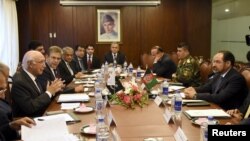Pakistan and Afghanistan held high-level meetings Thursday in an attempt to ease tensions between them following a series of terror attacks in Kabul that have killed scores of people.
An Afghan delegation led by Foreign Minister Salahuddin Rabbani met with Pakistani Prime Minister Nawaz Sharif in Islamabad and held separate talks at Pakistan's foreign ministry, officials said.
Sharif's office issued a brief statement noting that "matters relating to bilateral relations and mutual interest came under discussion," but no other details were released before the Afghan visitors returned to Kabul late Thursday.
Recent attacks
The two sides were expected to discuss Afghanistan's contention that Pakistan was involved in the recent attacks, and that Islamabad should act on its standing commitment to prevent renegade Taliban commanders from using Pakistan as a base for cross-border attacks into Afghanistan.
In the most recent incident, a car-bomb blast aimed at a convoy of government officials killed at least five people and wounded 16 others near the Kabul airport Monday.
Foreign minister Rabbani's delegation included Afghanistan’s acting defense minister and the country’s intelligence chief.
Their urgent visit to Islamabad followed Afghan President Ashraf Ghani's complaint that the attacks on Kabul were designed and planned by terrorists based in Pakistan, and carried out by "mercenaries" from “bomb-making factories and training camps” on Pakistani soil.
Pakistan has repeatedly denied any links to Taliban attacks inside Afghanistan and condemned the deadly violence. Before Thursday's talks, Pakistan's national security adviser, Sartaj Aziz, said the assaults on Kabul "created ... apprehension" that triggered Afghan leaders' criticism of Pakistan.
'Misunderstandings'
“We are going to exchange views on these issues and I hope ... any misunderstandings that exist between the two countries will be removed, inshallah (God willing)," Aziz said.
The Pakistani adviser said his government is determined to do all it can to facilitate peace efforts in Afghanistan, but repeated that it is up to Afghan authorities to decide how and when to proceed with a peace and reconciliation process with the Taliban.
Pakistan hosted the first round of peace talks between the Taliban and the Afghan government on July 7.
A second round of meetings set for July 31 was canceled, however, after news broke that longtime Taliban leader Mullah Mohammed Omar had been dead for at least two years -- since at least 2013 -- a disclosure that caused an upheaval in the Taliban hierarchy.




